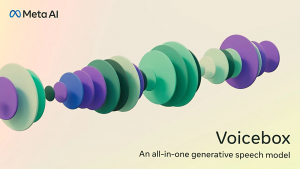In a groundbreaking development, Meta, the parent company of Facebook, has unveiled its latest generative artificial intelligence (AI) called Voicebox. Unlike traditional text-based AI models, Voicebox specializes in audio synthesis, allowing it to mimic speech patterns and generate natural-sounding audio clips. With the ability to read text in different languages and contribute to the immersive metaverse, Voicebox promises to revolutionize communication and accessibility. Let’s dive into the details of this innovative AI breakthrough.
Also Read: Meta Open-Sources AI Model Trained on Text, Image & Audio Simultaneously

The Evolution of Generative AI: From Text to Audio
Generative AI models like ChatGPT and Google’s Bard have long been capable of generating text-based responses using natural language processing and machine learning. However, Meta’s Voicebox takes the concept a step further by generating audio clips instead. This unique approach opens up exciting possibilities for enhanced communication and immersive experiences.
Also Read: An end-to-end Guide on Converting Text to Speech and Speech to Text
Voicebox: The Power of 2-Second Audio Samples
Voicebox, unveiled by Meta on Friday, introduces a novel technique for audio synthesis. Using just a 2-second audio sample, Voicebox can analyze and match the audio style, as well as generate text-to-speech or seamlessly recreate interrupted speech caused by external noise. This breakthrough technology aims to bridge gaps in communication and elevate the quality of audio interactions.

Breaking Language Barriers: Multilingual Capabilities
One of the most impressive features of Voicebox is its ability to read English text in various foreign languages. Whether it’s French, German, Spanish, Polish, or Portuguese, Voicebox can take an audio sample and transform it into natural-sounding speech in the desired language. This opens up new possibilities for global communication and language learning.

Enhancing the Metaverse: Voices that Bring Digital Worlds to Life
Meta envisions Voicebox as a powerful tool to enhance the metaverse, encompassing digital worlds where people gather to work, play, and socialize. By providing natural-sounding voices to virtual assistants and nonplayer characters (NPCs), Voicebox adds a layer of realism and immersion to these digital environments. Additionally, it has the potential to serve visually impaired individuals by enabling them to hear messages read in the familiar voices of their friends.
Also Read: Nvidia Introduces Tool to Build AI-Powered Life-Like Gaming Characters
Ethical Considerations: Balancing Authenticity and Potential Misuse
While Voicebox holds great promise, Meta acknowledges the need to address potential ethical concerns. The company is actively working on distinguishing between authentic speech and audio generated by Voicebox to prevent potential harm. Meta’s commitment to responsible AI development ensures that Voicebox will be deployed thoughtfully and with safeguards in place.
Also Read: EU Calls for Measures to Identify Deepfakes and AI Content
Our Say
Meta’s Voicebox AI represents a significant leap forward in audio synthesis and multilingual communication. By enabling natural-sounding speech in various languages and contributing to immersive digital environments, Voicebox has the potential to transform how we interact and experience the world. As Meta continues refining this innovative AI technology, it is crucial to balance pushing boundaries and ensuring responsible use. With Voicebox, the future of communication is set to become more inclusive, accessible, and captivating than ever before.
Learn More: Unlock the boundless world of Generative AI and learn more about such innovative technologies at our upcoming workshop at the DataHack Summit 2023.




